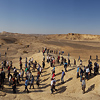Question: After exiting Egypt and receiving the Torah at Mount Sinai, the people of Israel with their newfound unity conquered the land of Canaan and turned it into the Land of Israel. “Eretz Israel” means the desire to be like the Creator.
This entire time, the development and implementation of Moses’ methodology continued. I wonder what people did before the construction of the Temple? After all, then there was no study of the Torah and the commandments. It was introduced much later.
Answer: There was no study because people did it in practice. The meaning of their life was to be constantly in increasing communication with each other and to reveal the Creator in their unity.
They felt this methodology, applied it and implemented it very clearly among themselves more or less. Although, in principle, this was the reason for the war.
Comment: The famous historian Josephus Flavius writes, “It is impossible to describe the differences in the customs and laws of many forms of rule that mankind had developed. Most could be subsumed under the following three types: monarchy, oligarchy, and democracy. And our legislator (Moses), abandoning all of the above, created the so-called theocracy.”
Theocracy is when a spiritual and governmental leader is represented in one person.
My Response: Spirituality rules over the people.
Comment: The state formed by the Jews existed for about 200 years without a regular army and without a centralized administrative apparatus. Spiritual mentors from the tribe of Levi were deprived of land allotment and lived in 48 cities that belonged to other tribes. They only taught people.
All the people were literate without exception. Moreover, children were taught to read and write at the age of three.
Besides, the Jews are the people who do not need a king. The first king Saul came after the death of Moses when he began a war with the neighbors. Before that the people managed without a king.
My Response: Spiritual communication was enough for them to exist.
In addition, they supported the Cohens and Levites, that is, all those who taught them and spiritually supported them. After all, the very first authority was based on upper governance.
Comment: Another interesting fact is that a Jewish king could be subjected to bodily punishment for various offenses. If, for example, he allowed himself to take more horses or money, he could be punished.
My Response: Yes. The upper spiritual governance was above the king.
Comment: Also, there was a special attitude to the weak, frail, women, and slaves. It was believed that if you had one pillow, you should give it to a slave.
My Response: That is, relations between people required them to aim for greater understanding, interaction, interconnection, and greater positive interdependence.
[260181]
From KabTV’s “System analysis of the development of the people of Israel,” 7/1/19
[260181]
From KabTV’s “System analysis of the development of the people of Israel,” 7/1/19


No comments:
Post a Comment